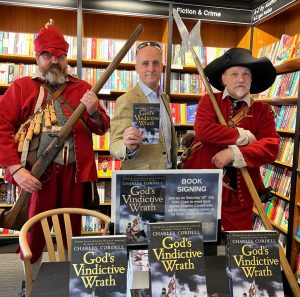Writing & Publishing Historical Fiction – an author’s perspective
Writing & Publishing Historical Fiction is an article by Charles Cordell on an author’s perspective of the world of writing, editing and book publishing.

This is my blog post on writing and publishing historical fiction – an author’s perspective. This is not a post on how to write or pitch a novel. It is more a collection of tips, thoughts and advice for writers hoping to enter the world of publishing. It is my way of sharing the gleanings of my writer’s journey. I wish I had found something similar earlier in that journey.
I hope this page will offer some useful insights and advice on the world of writing, editing and book publishing. It is not perfect and comes with a health warning. This is one author’s perspective. It is based on my experience, my journey. Others may have different insights, perspectives and advice.
I think most outsiders find book publishing and the literary industry opaque. It is difficult to understand. There is a wealth of (usually) well-meaning advice. But this is often contradictory, reflecting an industry with no clear standard practices. To a newcomer, some of those practices appear unbelievably arcane.
Literary Industry – joy, disappointment, preparation & luck
It is a beautiful and a cruel world, filled with joy and bitter disappointment. I would implore anyone thinking of entering it to do their research first. The average author earns surprisingly little. Huge numbers of very good writers don’t get published. Many good books receive no marketing support and go unread.
Ultimately, there is a great deal of luck involved. I feel extremely fortunate to have been published. I can only hope enough readers continue to find, buy, read and enjoy my books. If not, the chances of more of the Divided Kingdom series of English Civil War fiction being published are slim.
Writing Fiction – self-help, groups, courses & agencies
The internet is awash with advice, services and support groups for writers. Many are probably very good. But there are others that prey on inexperienced or frustrated writers. My advice would be to take it one step at a time. Do not rush in or sign up for a costly writing course until you are sure you need it.
There is a lot you can do to teach yourself about writing. The best advice I have found on the art of writing is Stephen King’s book On Writing. I think it remains unbeaten. I would also really recommend On Editing by Helen Corner-Bryant and Kathryn Price. This offers the clearest advice I have seen on plotting, point-of-view, editing and pitching.
But before you commit your life to writing, it is vital that you find out if you can write. The only way to do this is to open your writing to review. There are umpteen self-help groups, such as Litopia. If this works for you, great. My recommendation would be Jericho Writers. They offer lots of free advice, tips and tools on writing, pitching and marketing – more if you sign up as a paid member.
There are also a range of agencies offering writing courses. Some are expensive. Some are dubious. I would suggest that the creative writing courses offered by the Open University are worth considering, at least as a starter. If nothing else, they will give you a benchmark when looking at other courses.
Historical Research – authenticity, realism & relevance
It strikes me that good historical fiction needs to say something. I am enormously grateful that so many readers tell me that my writing feels very relevant today. This is exactly what I hoped for. I have seen so many echoes of The General Crisis of the 17th Century in my time, on the ground, in some of what I would suggest are the fraying margins of civilisation.
Really good historical fiction also needs to be authentic. It needs to be well researched. There is a danger that a writer can become lost in never ending research and never actually write. I hope I have found the right balance.
But most of all, historical fiction should make us feel what it was like to live, love and fight in another time. If it can, it should make us think and teach us something of ourselves.
Editing – finished work, art, craft & professional help
Before you approach any agent or publisher, you need to finish writing your novel. (It is different if you are pitching a non-fiction idea.) Agents and publishers will only consider a complete work – not just three chapters. You also need to edit your manuscript. Sadly, agents don’t really take half-finished debut works.
If at all possible, you should seek professional help with editing. It is a specific skill. Whilst writing may be an art, editing is more of a craft. Very many writers will need help with this. My personal recommendation would be Cornerstones Literary Consultancy. They are not cheap, but worth it.
Book Publishing – misunderstanding & misconception
Book publishing remains shrouded in misunderstanding and misconception. Take time to research the industry, as best you can, before attempting to enter it. The best source of insight and advice I have found is a short e-book by the agent Rupert Heath entitled Sex, Lies and Book Publishing. I wish I had found it earlier in my journey.
I think the bit that nobody really explains is that there are at least five routes to publishing. Broadly speaking, these lead to traditional publishing, independent publishers, hybrid, self-publishing and vanity publishing. There is a huge focus on traditional and self-publishing. However, it is important to understand all the options, for better or worse.
Traditional, ‘Big 4’, Imprints & Independent Publishers
Traditional publishing is generally seen as a publishing deal with a large publishing house – one of the ‘Big 4’. This is what most writers aspire to. However, it is only possible via a literary agent – hence the focus on pitching to agents. Ultimately, the agent will take 15% of an author’s royalties, but should deliver increased revenue in return. Royalties are usually paid by a Big 4 publisher at 8% of their returns, or trade price of the book.
Independent publishers are those that are not owned by one of the Big 4 publishing houses. Do not confuse these with familiar names that are now imprints bought out by a publishing house. Some ‘indie’ publishers will take ‘unsolicited’ manuscripts direct from writers. An agent is not always needed. Some independent publishers also offer slightly higher royalties – up to 10% of the trade price of a book.
Hybrid, Self-Publishing & Vanity Publishers
Hybrid or collaborative publishing is a model in which the author co-funds the cost of publishing. This is usually on a 50-50% basis with the publisher. In some cases, the author can crowd-fund their share. In return, the author receives much higher royalties on books sold. There are some very respectable hybrid publishers producing beautiful printed books. However, there are others that simply charge the author and use self-publishing sites and printing services.
Self-publishing used to be thought of as solely about e-books. However, there are also options for print on demand. Many authors enjoy the total control they have with self-publishing. They do not sell the rights to their manuscript and keep all the profits. Some earn considerably higher revenues than traditionally published authors.
Finally, there is vanity publishing. This is where a writer pays for their manuscript to be published. It is one way to become a published author. However, it is not seen as good practice within the industry.
Book Prices – cheaper than ever, but a VAT free luxury
The total rate of inflation in UK has seen prices rise 79.8% in the last 20 years (ONS Consumer Price Index 2000-2023). However, the average price of a printed book sold in the UK has increased by only 12% in that time (Nielsen BookData 2000-2022). Profit margins are now extremely thin.
Unlike almost any other industry, the price of a book is set at manufacture. It is printed on the book by the publisher. This RRP is increasingly ignored by retailers. However, prices are adjusted down, not up, allowing the retailer to sell books at a discounted price. The RRP printed on the book acts as a price cap.
The average paperback novel remains priced between £7.99 and £8.99 (2024). This is now less than two pints of lager (ONS pint of lager £4.70 in Feb 2024).
Books are exempted VAT in the UK. They are considered essential by HM Government (unlike beer). And yet many see books as a luxury that can only be bought at Christmas.
Royalties – advances, net receipts & author earnings
When a published book is sold the author receives royalties. Traditionally, this was a percentage of the book’s RRP. However, it is increasingly common for author contracts to stipulate a percentage of the publisher’s net receipts – the amount the publisher actually receives from sales to retailers.
Royalties for fiction are now normally about 8% of the publisher’s return from actual book sales. The larger figures sometimes paid to authors are an advance on those royalties. The author must wait until enough copies are sold to cover the advance before any more royalties are paid.
Average UK author income is now just £7K (ALCS Apr 2022). This is based on a very unequal distribution of overall income from writing. The top 10% of authors earn about 47% of the total income of all UK authors (Newcastle University 2022). Disparities between gender, age and ethnicity are also marked.
Risk – book publishing costs, profit margins & sale or return
The publisher’s costs make up 32% or approximately 1/3 of the cover price. These include their overheads, printing, marketing and distribution. A publisher’s net profits are reckoned to be about 5%. They will expect to sell 3/5 of the copies sold at a loss or negligible profit in order to secure favourable placing with a large retailer or supermarket. Dependent on the discount offered, retailers will take the remaining 55%.
Ultimately, it is the publisher who holds the financial risk. Books placed with a retailer are always on sale or return. Sadly, some 25% of all new books published in the UK go unsold, are returned and pulped. Sometimes, it seems that the industry doesn’t really know what the reader wants.
Marketing Your Book – trends, celebrities & supermarkets
Writing and publishing historical fiction brings together an extraordinary mix of art, craft, research, manufacture and business acumen. Sadly, today, much of the industry is risk averse. It tends to back trends. If you are writing within the bounds of a well-tried genre, this is fine. If not, it can be a problem finding an agent or publisher.
Where this really counts is in the amount of marketing heft a publisher gives to a book. Generally, a publisher will put their money and effort behind established bestseller names and celebrities. They won’t back an outside horse. Their focus will be on placing a book with major retailers – particularly with supermarkets.
This means that many good books go unseen. Even with a Big 4 publishing contract, most authors need to do much of their own marketing. I have found the marketing advice and courses offered by Anna Caig Communications, tailored for authors and creatives, really helpful with this.

Book Revues & Ratings – algorithms & second contracts
Book revues and ratings are important. They make a difference. These include editorial revues, reader reviews and ratings. Amazon remains the most powerful site for ratings. Goodreads is also influential. However, book ratings can also now be left on Google and across social media sites.
Unfortunately, the online visibility of a book is very much governed by algorithms. The more ratings, reviews and sales a book receives, the more it is pushed by platforms such as Amazon. Without them, even the best book is left lost in the forest, unseen.
Ultimately, a publishing contract for another book is unlikely without positive revues and ratings. If you enjoy reading one of my books, please do consider posting a rating and/or a few words of review. For historical fiction, one useful site for listings and potential revues is the Historical Novel Society.
Writing a Series – book #2 & doing it all again
What many publishers want is a series. However, writing a second novel can be difficult. Book #2 took much longer to write than I hoped or expected. I should have started writing it much earlier. Think carefully about any sequel you think you will write and – don’t delay. Plan and plot it as soon as you can. If possible, write it before book #1 is published.
Writing a second novel was very different, tougher experience. When I wrote God’s Vindictive Wrath, my debut novel, I had no idea if anyone would read or enjoy it. I felt I had nothing to lose. But the reaction, the reviews and comments from so many readers, was wonderful – overwhelming.
A second book felt much more like a test – could I even do it again? I desperately did not want to disappoint. A number of well-established authors told me that this is not an unusual experience. Book #2 is the toughest to write. I hope this is true!

More on Writing & Publishing Historical Fiction
I hope some of these insights on writing and publishing historical fiction are useful. You can find and follow more posts on writing at Author Blog. These include posts about my journey from Army to Author and becoming a Historical Fiction Author, as well as insights on Book Publishing and my Author Life and Writing today. If you would like to receive an email notification of my next post, just click the button to follow.
If you want news of upcoming books, offers and editorial reviews, you can find the latest updates and follow the story at Divided Kingdom News. Alternatively, check out the reader reviews and ratings, and follow Charles Cordell on Goodreads and Amazon, or social media at #DividedKingdomBooks.
I really enjoy giving talks and battlefield walks. These include Author Talks and book signings as well as English Civil War history talks and Battlefield Walks. If you want to join me, please check out the calendar at Charles Cordell Events. If you can make it, come along and let me sign your Divided Kingdom books.
Divided Kingdom – English Civil War historical fiction
This author blog post aims to provide a little of the backstory to my writing and the Divided Kingdom books. This historical fiction series is set in Early Modern Britain during the English Civil War. I hope you enjoy all of the novels and short stories.
The Divided Kingdom books take a fresh approach. They are not based on a single hero. They do not take sides. Their voices – ordinary men and women – face each other in the chaos of Britain in civil war. They are both relatable and sharply relevant today. They are also as historically accurate as is possible.
Please do check out some of my writing at Divided Kingdom Books, including the reviews, read samples and FREE ebook short story.
See More – social media & the Divided Kingdom Readers’ Club
Alternatively, visit Facebook, Instagram or Twitter for more posts on writing and publishing historical fiction, research and book news. These include upcoming events and opportunities to meet. Just follow on social media at #DividedKingdomBooks on:
If you want even more, why not join us in the Divided Kingdom Readers’ Club. You will receive a monthly email direct from me in which I share my insights, as well as access to unpublished work. If you think this is for you, click the link and join the Clubmen.
Spread the Word & Share
If you think others will like what you see, please share via email or your social media:






